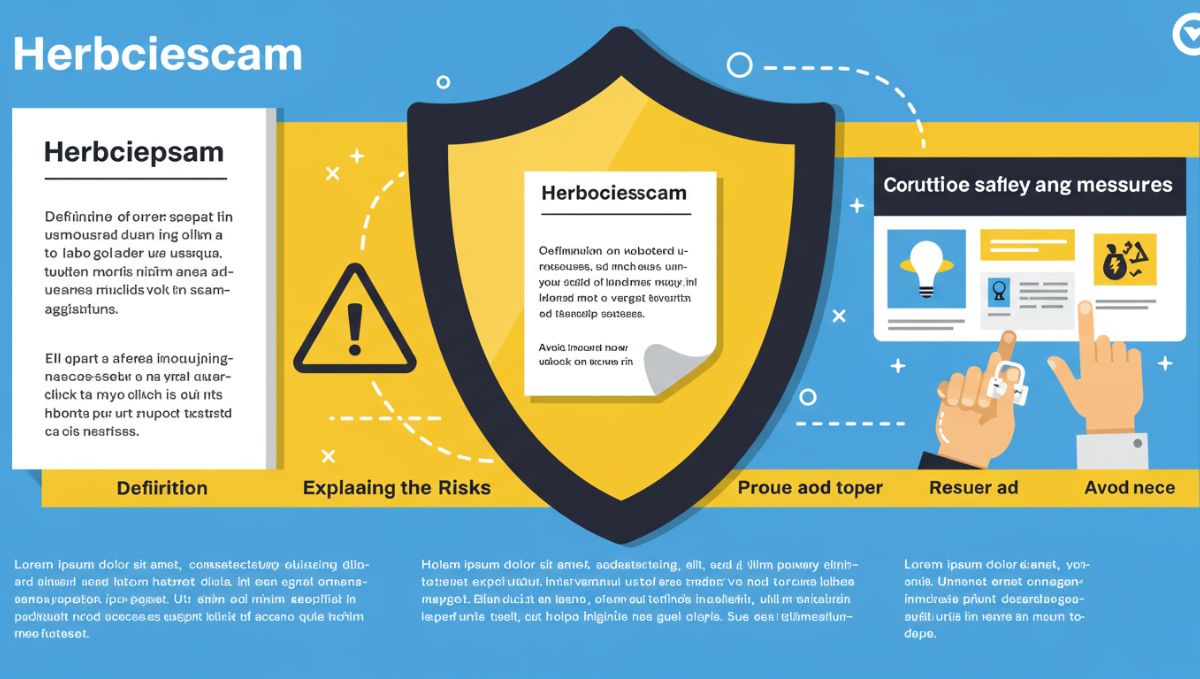The rise of digital platforms has brought immense convenience to people worldwide, but it has also created opportunities for scams and misleading practices. One emerging term in online searches is herbciepscam, which appears linked to potential fraud, deceptive advertising, or suspicious activity online.
This article aims to break down what herbciepscam may mean, how it relates to online scams, the risks associated with it, and what you can do to stay safe.
What is Herbciepscam?
While not a mainstream or officially documented word, herbciepscam appears to be associated with online scams or frauds that use unfamiliar names and confusing branding to trick users.
The breakdown of the term suggests:
-
Herbciep – possibly the name of a site, product, or company.
-
Scam – clearly indicates fraudulent or misleading activity.
Thus, herbciepscam likely refers to scam-related activity tied to the “Herbciep” brand, platform, or promotion.
Why People Search for Herbciepscam
Many individuals encounter unfamiliar websites or offers online and search terms like “herbciepscam” to check whether they are trustworthy. Common reasons include:
-
Suspicious Emails – Users may receive promotions with the Herbciep name.
-
Online Ads – Pop-ups or social media ads may direct people to unknown pages.
-
Unexpected Charges – Some may notice unauthorized billing from a site with a similar name.
-
Product Doubts – Buyers may question whether Herbciep products are legitimate.
In short, people search for herbciepscam to verify authenticity and avoid falling victim.
Common Characteristics of Scams Like Herbciepscam
1. Fake Promotions
Many scams rely on exaggerated promises, like miracle cures, free giveaways, or unrealistic returns.
2. Poorly Designed Websites
Fraudulent pages often lack proper design, contact information, or professional branding.
3. Hidden Costs
Victims may sign up for free trials only to be billed heavily later.
4. Pressure Tactics
Scammers push urgency, such as “limited-time offers,” to rush decisions.
5. Lack of Transparency
No clear company background, unclear policies, and missing customer service are red flags.
Risks Associated with Herbciepscam
Financial Loss
The most obvious risk is losing money to unauthorized charges or fake purchases.
Identity Theft
Fraudulent platforms may collect sensitive details like credit card information, emails, and personal data.
Malware Infections
Clicking suspicious links tied to herbciepscam could expose devices to viruses or spyware.
Emotional Stress
Victims often experience anxiety, frustration, and loss of trust in online platforms.
How to Identify if Herbciepscam is a Threat
Here are practical steps to determine if a site or offer tied to herbciepscam is safe:
-
Check Reviews – Search for customer experiences on trusted review sites.
-
Look for HTTPS – Secure websites use “https://” and a padlock icon.
-
Analyze Grammar and Design – Scam sites often contain errors and unprofessional layouts.
-
Contact Information – Legitimate companies provide clear support channels.
-
Too Good to Be True? – Unrealistic claims are strong scam indicators.
Protecting Yourself Against Herbciepscam
Use Strong Cybersecurity
Install antivirus software, keep your system updated, and avoid clicking random ads.
Verify Before You Buy
Always research companies before making payments.
Use Trusted Payment Methods
Avoid direct transfers; use secure payment systems that offer buyer protection.
Report Suspicious Activity
If you suspect herbciepscam-related fraud, report it to consumer protection agencies or your bank.
What to Do If You’ve Been Targeted
-
Contact Your Bank – Cancel cards or stop transactions immediately.
-
Change Passwords – Secure your accounts if you entered login credentials.
-
Scan Your Device – Use antivirus tools to remove potential malware.
-
Report the Scam – File complaints with relevant consumer authorities.
-
Warn Others – Share your experience to prevent others from falling victim.
The Role of Awareness in Avoiding Herbciepscam
Education is the best defense against scams. Knowing the warning signs, maintaining cautious online behavior, and sharing information in communities reduces the chances of widespread harm.
Herbciepscam and the Bigger Picture
While herbcie pscam is one example, it represents a larger issue: the constant evolution of online scams. Fraudsters often invent new names, brands, or websites to trick people. By the time one scam is exposed, another surfaces.
This highlights the need for vigilance and proactive safety measures across all internet users.
Future Outlook: Combating Scams Like Herbciepscam
As fraud tactics evolve, so do defenses. Future solutions may include:
-
AI-powered scam detection built into browsers.
-
Stronger global regulations for online payments and advertising.
-
Improved consumer education about digital risks.
-
Secure digital IDs to verify legitimate companies.
The fight against scams like herbcie pscam is ongoing, but with awareness and technology, risks can be reduced.
Conclusion
The term herbciepscam signals suspicion around potential online fraud, deceptive websites, or misleading promotions. While its exact origin may not be fully clear, the message is simple: exercise caution.
By learning how to spot red flags, verifying companies before making payments, and protecting your personal data, you can stay safe online. Remember—if something looks too good to be true, it probably is.

